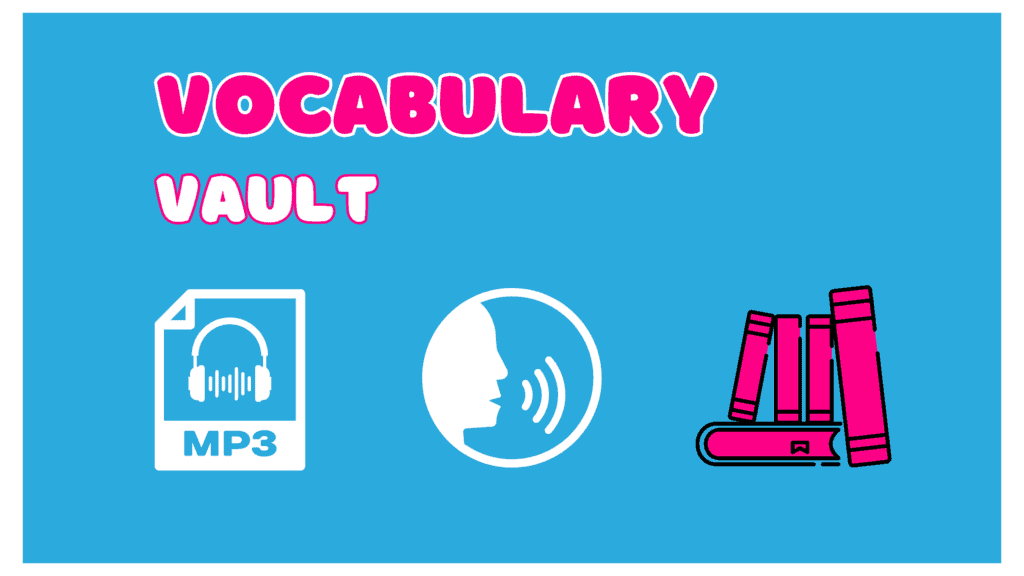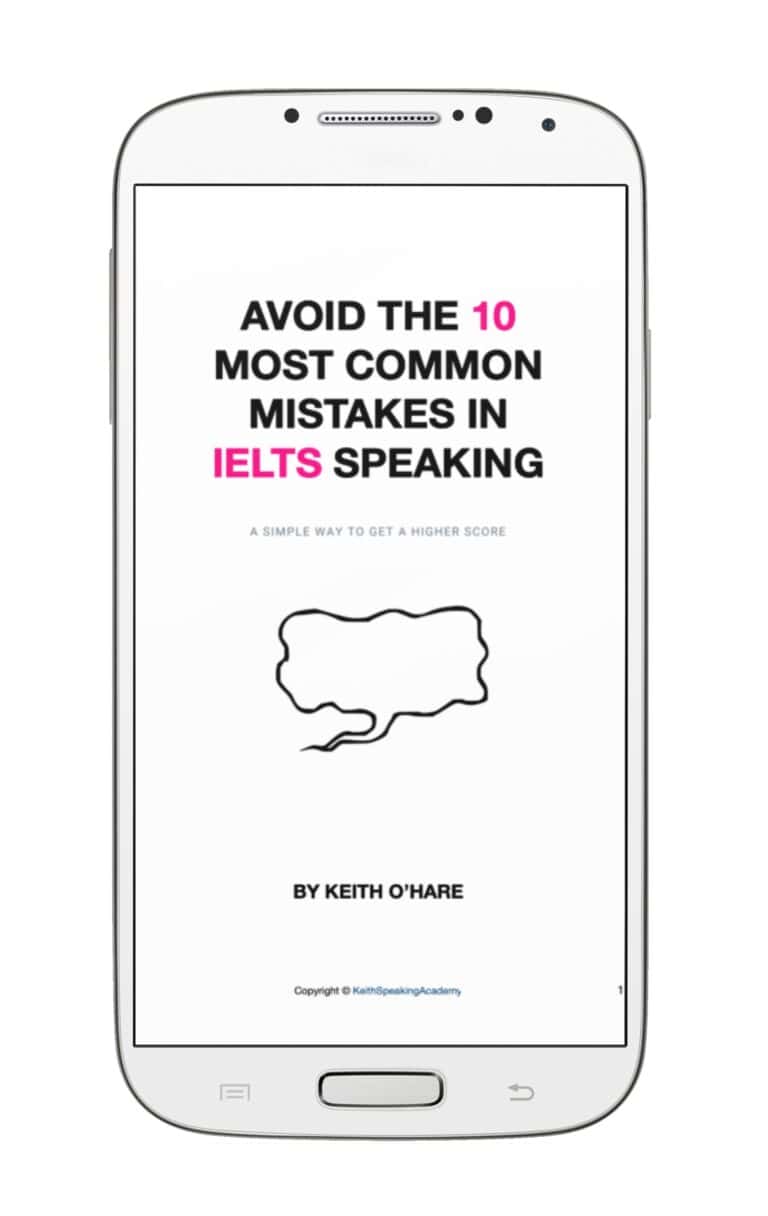IELTS Speaking Lesson about Books
👇 Take this lesson with you! 👇
In the IELTS Speaking test, you may asked about books in Part 1 for example, whether you like reading and what kind of books you read, or in Part 2 for example, a book you recently read and liked.
In this IELTS Speaking lesson on the topic of books, you will learn how to describe books, and discuss a book you recently read.
Table of Contents
IELTS vocabulary: Books
It is essential to build your vocabulary and also to start activating it.
That means you should try making some phrases with the vocabulary below.
Remember to always learn the collocations of new words.
Literature (n.) = written works (books)
Literacy (n.) = the ability to read and write
Literate (adj.) = able to read and write
Examples:
I am really into English literature
I think it’s really important for young children to become literate
Types of books
Fictional or non-fictional BOOKS
Fictional novels- think of the different genres –
- Crime novels
- Romance
- Thriller – suspense
- Comedy
- Action
- Sci-fi
You could also think of books that have been made into a film
Examples:
I am a big fan of crime novels
I don’t like action films too much, I find them too unrealistic

Non-Fictional BOOKS
- Biographies
- Autobiographies
- Hobbies
- Historical (adj.)
- Personal development = self help
- Books related to your field of work
- Recipe book
- Travel guide
Examples:
I enjoy reading a good auto-biography
I read personal development books now and again
Describing the story
- Plot = storyline
- Setting = background (where – when)
- Characters = people in the story
- Protagonist (main character / hero)
Examples:
This book has a gripping plot
It is set in the middle ages in England
The protagonist is a magician called Merlin
Phrases to describe how we read books
- To skim through books in the bookstore
- To flip through a book
- To leaf through a book
All of these above mean to glance at quickly, not to read in depth.
- A voracious reader
- An avid reader
- A bookworm
All of these mean someone who reads a lot
Describing a book in IELTS Speaking
A heavy read (n) = that book is difficult to read
It’s a good read
This book is easy reading
This book makes easy reading
I could’t put it down
It had me spellbound
It was a gripping novel
I read it from cover to cover
It’s a captivating/great read
It had an intriguing plot

Idiomatic expressions about books
- To turn over a new leaf = to start anew / start something fresh
- I want to get in my boss’s good books = I want to do something to win his/her favour
- She threw the book at me = she told me off very strongly / scolded me for doing something wrong
- Take a leaf out of Mary’s book = learn from Mary (suggesting she is better than you)
Useful vocabulary tools
Great for finding words related to any topic you are studying. Great for expanding your vocabulary on a certain topic.
You put in a word and it gives you real life examples so you can see how to use that word
https://skell.sketchengine.co.uk/run.cgi/skell
You put in a word and it gives you all the words that collocate with it, including nouns, verbs, adjectives, adverbs and so on. Priceless tool, once you get to used to using it.
Pronunciation Files For Vocabulary From My Best Live Lessons
Use Words EASILY in English Conversations!
More IELTS Speaking Free Lessons
If you liked this lesson, leave a comment below!
There are more lessons you can follow in the links below too.
ART in IELTS Speaking. How to describe different kinds of art, feelings about art, exhibitions and art in education
CHANGE in IELTS Speaking. Learn to talk about personal, professional and global change, and get some tips for IELTS Speaking Part 3
FOOD in IELTS Speaking. Vocabulary and collocations to talk about food, healthy food and cooking.



Thank you sir ! You are really helpful to me but still facing something difficulties in speaking better English
I have taken leaves out of Keith’s book. He is an amazing teacher.
Nice pun, and thanks for the comment.
Really u r extra ordinary
Tnk u so much Mr.keith
Now I m really learning this english and having fun 🤩 I m very great ful to you
Be blessed by the divine 🙂
that’s great – keep having fun and you will learn more!
I’d like to express my gratitude to Sir keith for your great efforts.
As you have said language is something like sense.Not only words.I have no interest to pass exams.So I can read your sites without anxious.
Thnak you for your efforts. you make me understand english language beyond the words.
Delighted to hear that – and so glad my website is helping you!
If i follow properly, can i get 7 point in speeking?
Well that depends on your present level, and a few other factors, but for sure it will certainly help.
I’d like to express my gratitude to Sir keith for your great efforts.you make me loving english language more.
So pleased to hear that, if you are loving learning English, then I am a happy man 😁
Hi Keith
my examiner has a resemblance with you. although he gave me an 8 in speaking, I scored only 6.5 in writing so need to sit again in the test for 8 each. Hopefully, finger crossed, I require 8 in speaking again ..your style of teaching, mastery over the content makes it possible for me to touch this band score of 8 in my first attempt. You are the best teacher, after getting my score I can register myself as a teacher in Australia, and will surely imitate your teaching techniques to make my class full of entertainment along with enlightenment rather than being a boring teacher. I am following your Udemy course too. my test is on the 5 of March, I will post after achieving the required score.
Wow – great score on speaking – well done!… and so please I could help.
Best of luck with your writing in the re-take.
Fingers crossed for you.
Keith sir I am your student , you are really a great personality, benevolent , wonderful teacher and blessing for many …thanks and God bless you ….
That’s very kind, thank you so much!
Hello Keith, I just wanted to come by and say thank you indeed for all your efforts, and then, if it’s possible, please leave Lesson notes for ” Weather and computer and IT ” Live lessons.
Best.
Appreciate it Ali. I will see what I can do with those other topics you mention.
Really appreciate to you sir… vedios Really helpful
So pleased to hear that!
Sir please send yours online classes
You can find all details (including signing up) of my 2 online courses here – https://keithspeakingacademy.com/ielts-speaking-online-courses
Hello sir ☺ can u send me yours online course
Hi Aparna,
You can find all details of my 2 online courses here (including signing up) – https://keithspeakingacademy.com/ielts-speaking-online-courses
Frankly speaking.i think you are a great teacher .i am a teacher of english too but i feel that iam in need of more flexibility.big thanks for you.
Thank you and keep practicing your craft – you will improve!
Hello sir,i have been watching your video for past 15 days.i am preparing for ielts and its been 3 months and i still not able to speak english.i dnt knw when can i speak fluently..can you please give me some tips
Be patient my friend. It takes time to build up fluency. Try lots of repetition – repeat the phrases when you watch my videos, and also get a speaking partner if possible, so you can practice speaking, reacting and building flexibility.